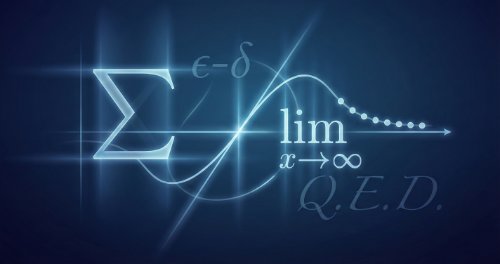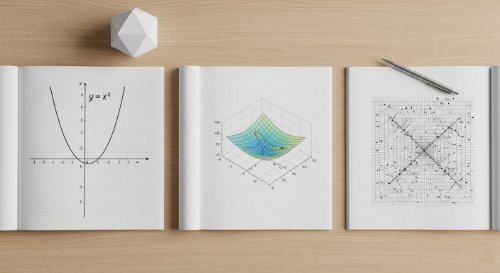Convergence of Infinite Sequences and Series - Advanced Calculus (Undergraduate Advanced)

MAT 223: Real Analysis
This learning track provides the complete theoretical machinery of single-variable calculus and analysis. We build the subject from first principles, establishing the rigorous logical framework required for advanced quantitative disciplines. This is the 'why' behind the mathematics that powers science and engineering.
This track is built for second-year engineering and physical science students, particularly those at the University Of Ibadan. It is also structured for any student requiring the same rigorous theoretical foundation for advanced quantitative study.
On completion, you will command the complete theoretical basis of single-variable calculus. You will construct formal proofs, rigorously analyse function behaviour, and determine the convergence of infinite series. This programme provides the non-negotiable prerequisite knowledge for advanced study in differential equations, complex analysis, and theoretical physics.
MAT 223: Real Analysis
This learning track provides the complete theoretical machinery of single-variable calculus and analysis. We build the subject from first principles, establishing the rigorous logical framework required for advanced quantitative disciplines. This is the 'why' behind the mathematics that powers science and engineering. This track is built for second-year engineering and physical science students, particularly those at the University Of Ibadan. It is also structured for any student requiring the same rigorous theoretical foundation for advanced quantitative study. On completion, you will command the complete theoretical basis of single-variable calculus. You will construct formal proofs, rigorously analyse function behaviour, and determine the convergence of infinite series. This programme provides the non-negotiable prerequisite knowledge for advanced study in differential equations, complex analysis, and theoretical physics.

MTH 207: Real Analysis I
Real Analysis bridges the critical gap between computational calculus and rigorous advanced mathematics. This learning track delivers the complete NUC CCMAS MTH 207 curriculum, transitioning you from intuitive understanding to formal mathematical proof. It establishes the theoretical foundation required for serious modelling in science, engineering, and pure mathematics.
This programme is targeted at mathematics majors and advanced undergraduates in physics and engineering who have completed foundational calculus. It is designed for students requiring the rigorous analytical skills demanded by graduate-level studies and theoretical research.
You will master the construction of rigorous proofs for sequence and series convergence, applying cornerstone theorems like Bolzano-Weierstrass and Cauchy criteria. You will achieve a formal command of continuity and differentiability, deriving major calculus rules from first principles. Completion provides the non-negotiable prerequisite knowledge for advanced studies in functional analysis, differential equations, and theoretical physics.
MTH 207: Real Analysis I
Real Analysis bridges the critical gap between computational calculus and rigorous advanced mathematics. This learning track delivers the complete NUC CCMAS MTH 207 curriculum, transitioning you from intuitive understanding to formal mathematical proof. It establishes the theoretical foundation required for serious modelling in science, engineering, and pure mathematics. This programme is targeted at mathematics majors and advanced undergraduates in physics and engineering who have completed foundational calculus. It is designed for students requiring the rigorous analytical skills demanded by graduate-level studies and theoretical research. You will master the construction of rigorous proofs for sequence and series convergence, applying cornerstone theorems like Bolzano-Weierstrass and Cauchy criteria. You will achieve a formal command of continuity and differentiability, deriving major calculus rules from first principles. Completion provides the non-negotiable prerequisite knowledge for advanced studies in functional analysis, differential equations, and theoretical physics.

MTH 201: Mathematical Methods I
This learning track delivers the complete mathematical toolkit required for a university-level science, engineering, or computing degree. It systematically covers the entire MTH 201 curriculum, building from the foundational principles of single-variable calculus - functions, limits, continuity, and differentiability - to the advanced methods of multivariable calculus, infinite series, numerical methods, and ordinary differential equations. This is the definitive preparation for advanced quantitative study.
This programme is designed for second-year students offering MTH 201 at Obafemi Awolowo University, Ile-Ife, Nigeria. It is also helpful for any student in a STEM field - including physics, engineering, and computer science - who requires a rigorous and comprehensive command of calculus and its applications.
This track delivers a full skill set in mathematical analysis and applied problem-solving. Graduates will be able to solve a wide range of problems, from optimising multivariable functions to modelling dynamic systems with differential equations and testing the convergence of infinite series. This programme directly prepares students for success in advanced courses in vector calculus, partial differential equations, and real analysis, providing the necessary foundation for a career in engineering, data science, or theoretical physics.
MTH 201: Mathematical Methods I
This learning track delivers the complete mathematical toolkit required for a university-level science, engineering, or computing degree. It systematically covers the entire MTH 201 curriculum, building from the foundational principles of single-variable calculus - functions, limits, continuity, and differentiability - to the advanced methods of multivariable calculus, infinite series, numerical methods, and ordinary differential equations. This is the definitive preparation for advanced quantitative study. This programme is designed for second-year students offering MTH 201 at Obafemi Awolowo University, Ile-Ife, Nigeria. It is also helpful for any student in a STEM field - including physics, engineering, and computer science - who requires a rigorous and comprehensive command of calculus and its applications. This track delivers a full skill set in mathematical analysis and applied problem-solving. Graduates will be able to solve a wide range of problems, from optimising multivariable functions to modelling dynamic systems with differential equations and testing the convergence of infinite series. This programme directly prepares students for success in advanced courses in vector calculus, partial differential equations, and real analysis, providing the necessary foundation for a career in engineering, data science, or theoretical physics.
Course Chapters